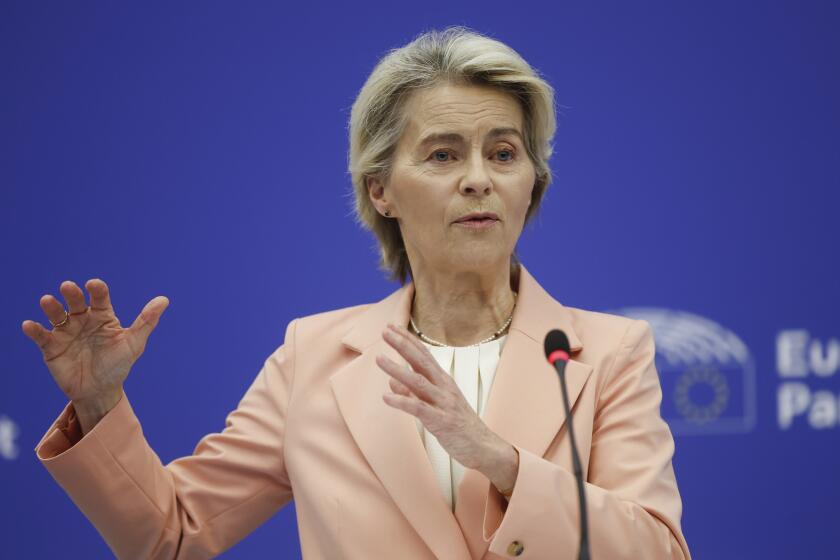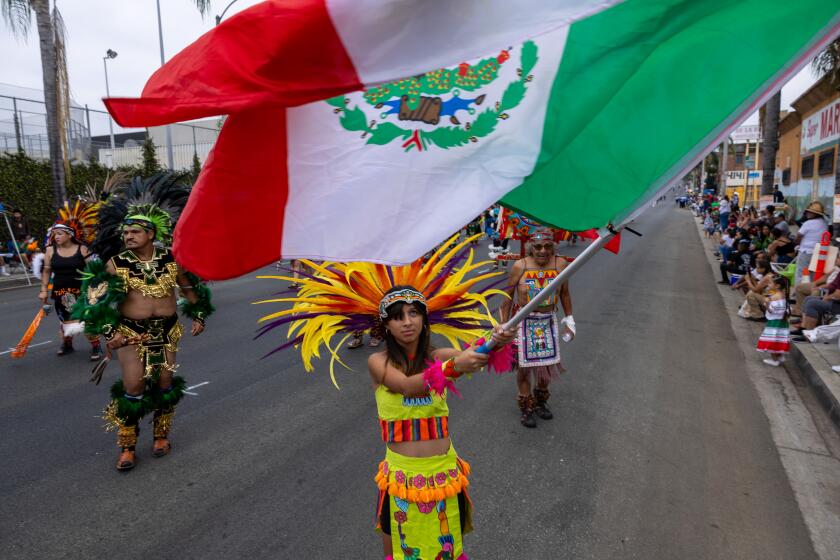Kosovo a frustration for Russia
The looming independence of Kosovo and promises of quick U.S. and European recognition have undercut and infuriated Russia at a moment when this oil-rich behemoth is eager to show that its global clout has been restored, analysts say.
Russian officials have spent weeks issuing dire assessments of the United Nations-administered province’s upcoming declaration of independence from Serbia, expected to be made this weekend.
The Russians have repeatedly decried Kosovo’s possible change in status as a “Pandora’s box” that would destabilize Europe by setting off a chain reaction of shifting borders. They have blasted the West for embracing Kosovo’s independence without taking the matter to the U.N. Security Council, on which Russia wields veto power.
But the world doesn’t seem to be paying much attention, and underneath the bluster Russia has found itself relatively powerless to steer the situation to its liking. At a time Moscow is seeking to play the strongman again after a decade of post-Soviet weakness, this sudden impotence is tough to stomach.
“The Russian position, in the end, will be humiliation,” said Lilia Shevtsova, a senior associate at the Carnegie Moscow Center.
In a last-ditch effort to stave off the declaration, Russia has called for an emergency session of the Security Council. But the U.S. and many European countries already have indicated their readiness to recognize Kosovo’s independence.
The European Union is preparing to send a 1,800-member security and justice force to the province as early as this weekend, setting the stage for the exit of U.N. officials, who have administered the area since 1999, when NATO drove out Serbian troops seen as abusing Kosovo’s majority ethnic Albanian population. Russia and Serbia say the EU mission is illegal.
Kosovo’s independence is sure to dramatically ramp up tensions between Russia and the U.S., which are already at loggerheads over a proposed American missile defense system, Iran’s nuclear program and the aspirations of several former Soviet republics to join the North Atlantic Treaty Organization. Some Russian analysts describe U.S. support for Kosovo’s ambitions as a blunder on a par with the invasion of Iraq.
“This will be used as yet another confirmation of the allegation that the West is not playing by the rules, that international law is applied very selectively, that there’s a lot of hypocrisy in the Western position,” said Andrei Kortunov, president of the New Eurasia Foundation, a Moscow-based think tank. “It’s yet another manifestation that it’s difficult, if not impossible, to deal with the West on serious matters.”
Russian officials have alluded without elaboration to a “contingency plan” they will put into effect if Kosovo proclaims independence.
Moscow also has hinted that it may eventually retaliate by recognizing the independence of breakaway regions of Georgia along Russia’s border. At its worst, that could set off armed conflict with Georgia -- and deepen neo-Cold War tensions with the U.S., Georgia’s ally.
“We can’t help but take into consideration the fact that [breakaway republics friendly to Russia] regard this as a precedent and pin their hopes on Russia,” said Sergei Markov, director of the Institute for Political Studies in Moscow. “Russia is now thinking whether to declare a complete independence of those countries or de facto incorporate them into Russia.”
Russian officials have been careful to say that they will not immediately recognize the independence of the republics -- but they have also mentioned the regions repeatedly and elaborately avoided ruling out the step. Residents of those lands have eagerly heard the message.
“Why doesn’t it also apply to us? Why can’t we do the same thing?” Abkhazian presidential spokesman Kristian Bzhania said in a phone interview this week. “The recognition of the independence of Kosovo will, directly or indirectly, lead to the declaration of independence of Abkhazia as well.”
But the fate of the republics is just a small slice of Moscow’s cataclysmic view of Kosovo’s independence. Russian officials raise the possibility of wholesale border changes and clashes over territory throughout Europe -- for example, in the Basque Country in Spain and even Scotland in Britain -- and the degradation of the United Nations.
Speaking in Geneva this week, Foreign Minister Sergei V. Lavrov warned that historians would one day regard the independence of Kosovo as “the beginning of the end of the current European project.”
“How can one bless the unilateral declaration of Kosovo independence, bypassing the Security Council, and at the same time hope that the Security Council will go on tackling other problems as if nothing is happening?” he asked.
Russian President Vladimir V. Putin said recently, “This can seriously damage the whole system of international law and will have negative implications both for the Balkans and for stability in other world regions.”
The sentimental and strategic link between Russia and the Slavic and Orthodox Serbia is old and deep. In recent years, Serbia has loomed as a symbolic cause among Russians, a bellwether of Moscow’s power as an international actor.
A weakened Russia’s inability to protect Serbia from a massive U.S. bombing campaign in 1999 remains a bitter and emblematic memory among many Russians.
But this is not Boris N. Yeltsin’s Russia. Afloat on oil and gas wealth, today’s Russia is eager to burst back onto the world stage as an international power broker. Moscow has built up ties with China, facilitated Iran’s nuclear program and dabbled in Middle East peace talks.
“We’ll never accept Kosovo’s independence until the moment Serbia does,” said Alexander Konovalov, president of the Institute for Strategic Assessment think tank.
“We’ll never accept Kosovo as a member of the United Nations. As a permanent member of the Security Council, we’ll block it by all possible instruments.”
--
More to Read
Sign up for Essential California
The most important California stories and recommendations in your inbox every morning.
You may occasionally receive promotional content from the Los Angeles Times.










